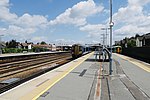The Judd School (often known simply as Judd) is an 11–18 voluntary aided, grammar school and sixth form in Tonbridge, Kent, England. It was established in 1888 at Stafford House on East Street in Tonbridge, where it remained for eight years before moving to its present location on Brook Street, in the south of the town. Founded by the Worshipful Company of Skinners, it was named after 16th century merchant Sir Andrew Judde, whose endowment helped fund the school. The Skinners' Company maintains close links with the school and makes up the majority of the governing body.
There are 1019 students in the school aged 11 to 18; the lower school is all boys, but of 350 students aged 16–18 in the sixth form, up to 60 are girls. The first headmaster was William Bryant, who oversaw the transition to the present site before his retirement in 1908. The current headmaster as of 2017 is Jon Wood, who replaced the previous headmaster, Robert Masters, at the start of the September 2017 year.
Judd pupils generally take ten General Certificate of Secondary Education (GCSE) tests in Year Eleven (aged 15–16), and they have a choice of four or five A-levels in the sixth form. An Office for Standards in Education, Children's Services and Skills (Ofsted) inspection in 2015 graded the school as "outstanding", and league tables published by the Daily Telegraph based on 2013 A-level results rank Judd as the second best (or best, if independent schools are excluded) school in Kent. In 2013, The Sunday Times newspaper ranked the school as the 12th best state secondary school (for pupils aged 11–16, with an optional two further years of education in sixth form) in the country. The majority of students go on to higher education following the completion of their A-levels at the end of Year Thirteen (aged 17–18), and in 2017, over one in five (38) Year 13 students gained an Oxbridge offer.
In September 2004, the school was designated a music and mathematics specialist school, which means it receives additional funding for those subjects. In 2007, the school was invited to become a High Performing Specialist School, and in April 2008 was successful in attaining science specialism status. As mathematics is automatically included under a science specialism, the school selected English to be included under the first specialism. The Judd School is now a specialist school in music with English, science and mathematics.







